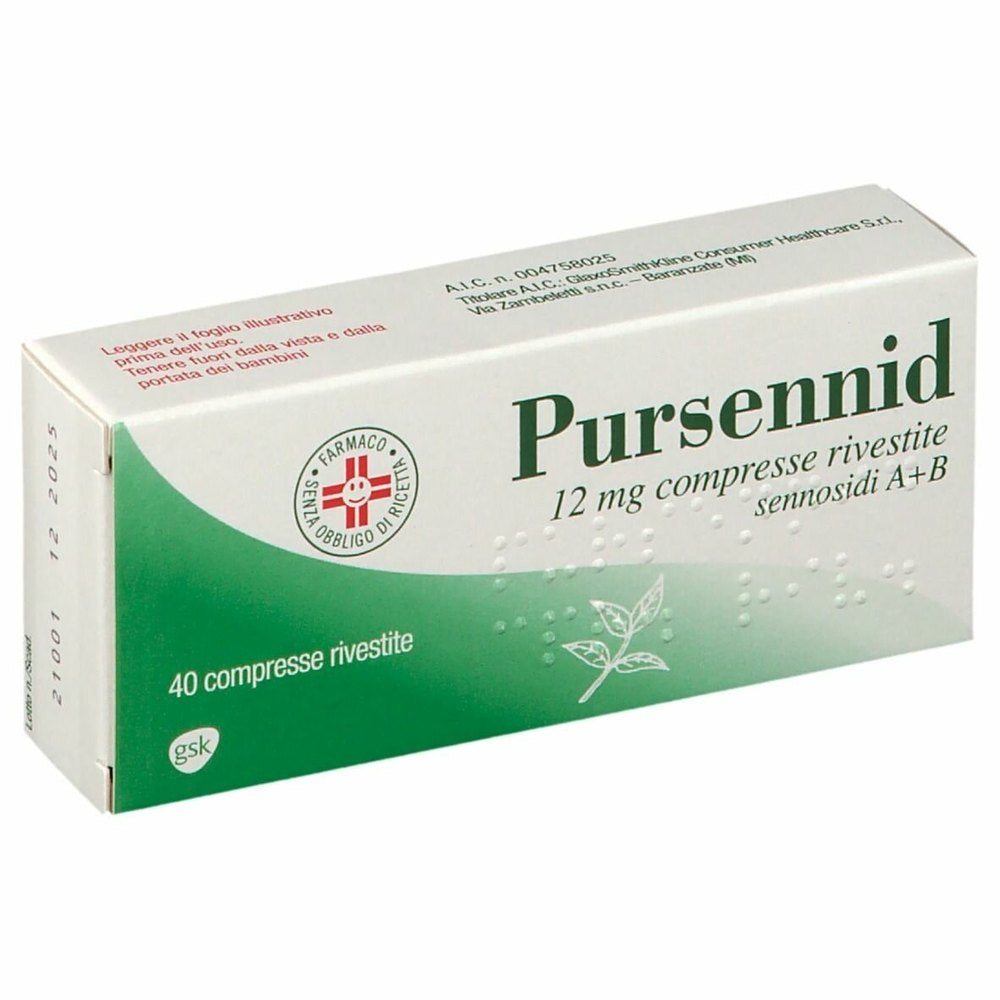
Pursennid Laxative Tablets is a preparation based on active ingredients extracted from the senna plant with a laxative action . Pursennid Laxative Tablets is indicated in cases of occasional constipation, difficulty evacuating and hard stools.
Pursennid Laxative Tablets works within 6-12 hours, by stimulating the large intestine, activating the evacuation of feces approximately 8 hours after taking it .
ACTIVE INGREDIENTS
Active ingredients contained in Pursennid 30 Laxative Tablets 12 mg - What is the active ingredient in Pursennid 30 Laxative Tablets 12 mg?
One coated tablet contains the active substance: sennosides A + B (as calcium salts) 12 mg. Excipients with known effect: lactose monohydrate; glucose anhydrous; sucrose. For the full list of excipients, see section 6.1.
EXCIPIENTS
Composition of Pursennid 30 Laxative Tablets 12 mg - What does Pursennid 30 Laxative Tablets 12 mg contain?
Lactose monohydrate; stearic acid; talc; corn starch; anhydrous glucose; sucrose; gum arabic; colloidal anhydrous silica; titanium dioxide; cetyl palmitate.
DIRECTIONS
Therapeutic indications Pursennid 30 Laxative Tablets 12 mg - Why is Pursennid 30 Laxative Tablets 12 mg used? What is it used for?
Short-term treatment of occasional constipation.
CONTRAINDICATIONS SIDE EFFECTS
Contraindications Pursennid 30 Laxative Tablets 12 mg - When should Pursennid 30 Laxative Tablets 12 mg not be used?
Hypersensitivity to the active substance or to any of the excipients listed in section 6.1. Contraindicated in the following medical conditions: inflammatory diseases of the digestive system (i.e. Crohn's disease, ulcerative colitis, liver disease, peritonitis and inflammatory bowel disease); irritation or obstruction of the gastrointestinal tract (i.e. spastic constipation, obstruction of the ileum/pre-ileum, cramps and pain, nausea, vomiting and colic); abdominal symptoms which may be due to an undiagnosed underlying condition, such as acute intestinal conditions which may require surgery (i.e. acute diverticulitis, appendicitis and massive diarrhoea); states of severe dehydration, with loss of water and electrolytes, especially hypokalaemia. Contraindicated in children under 10 years of age.
DOSAGE
Quantity and method of taking Pursennid 30 Laxative Tablets 12 mg - How to take Pursennid 30 Laxative Tablets 12 mg?
Dosage. Adults and children over 12 years of age: 2-4 coated tablets per day. Children between 10 and 12 years: 1-2 coated tablets per day. After a short period of treatment without appreciable results, consult your doctor. The correct dose is the minimum sufficient to produce easy evacuation of soft stools. It is advisable to initially use the minimum doses indicated. When necessary, the dose can then be increased, but without ever exceeding the maximum indicated. Paediatric population: contraindicated in children under 10 years of age. Method of administration: preferably take in the evening. Pursennid's action occurs after 6-12 hours. Administered in the evening, Pursennid appears the following morning. Laxatives should be used as infrequently as possible and for no more than seven days. Use for longer periods of time requires a doctor's prescription after adequate evaluation of the individual case. Swallow together with an adequate quantity of water (a large glass). A diet rich in liquids favors the use of the medicine.
CONSERVATION
Storage Pursennid 30 Laxative Tablets 12 mg - How to store Pursennid 30 Laxative Tablets 12 mg?
This medicinal product does not require any special storage conditions.
WARNINGS
Warnings Pursennid 30 Laxative Tablets 12 mg - About Pursennid 30 Laxative Tablets 12 mg it is important to know that:
The established dose should not be exceeded. Prolonged indiscriminate use of laxatives may lead to habituation and deterioration of intestinal function. The lowest effective dosage for the restoration of normal intestinal function should be used. If no intestinal improvement has been achieved, the dosage may be increased under medical supervision. Products containing senna and sennosides should only be used if a therapeutic effect cannot be achieved by changing the diet or administering bulking agents. The use of these drugs requires medical supervision: if no positive effects are achieved following treatment; if use is prolonged beyond one week of treatment; if symptoms persist or worsen; after laparotomy or abdominal surgery; if a skin rash is present, as this may be a sign of hypersensitivity; if nausea and vomiting are present, as these symptoms may be signs of a potential or existing intestinal blockage (ileus); in children between 10 and 12 years. Information on excipients. Lactose: Patients with rare hereditary problems of galactose intolerance, the Lapp lactase deficiency or glucose-galactose malabsorption should not take this medicine. Glucose: Patients with rare hereditary problems of glucose-galactose malabsorption should not take this medicine. Sucrose: Patients with rare hereditary problems of fructose intolerance, glucose-galactose malabsorption or sucrase-isomaltase insufficiency should not take this medicine.
INTERACTIONS
Interactions Pursennid 30 Laxative Tablets 12 mg - Which medicines or foods can modify the effect of Pursennid 30 Laxative Tablets 12 mg?'
Concomitant use of other drugs that induce hypokalemia (hydiuretics, adrenocorticosteroids and liquorice) may increase electrolyte imbalance. Hypokalemia (resulting from abuse of laxatives taken for a long time) potentiates the action of cardiac glycosides and interferes with antiarrhythmic drugs, with other drugs that induce a return to sinus rhythm (quinidine) and with drugs that induce QT interval prolongation.
SIDE EFFECTS
Like all medicines, Pursennid 30 Laxative Tablets 12 mg can cause side effects - What are the side effects of Pursennid 30 Laxative Tablets 12 mg?
This medicine may cause mild abdominal discomfort such as abdominal pain, cramps, irritation of the colonic and gastric mucosa. Other effects such as dehydration, hypotension, fatigue, myopathies, stomach pain, hyponatremia, renal disorders, secondary hyperaldosteronism, hypocalcemia and hypomagnesemia have also been reported. These adverse reactions are usually reversible once the laxative is stopped. Prolonged use or overdose of this medicine may cause nausea, diarrhea with excessive loss of electrolytes, especially potassium (hypokalaemia). There is also the possibility of developing megacolon. During treatment, a yellow-brownish (pH-dependent) coloration of the urine due to metabolites may occur, which has no clinical significance. Habituation has been reported after prolonged treatment. The adverse reactions are listed below by system organ class and frequency. The frequencies are defined as: very common (>= 1/10); common (>= 1/100, < 1/10); uncommon (>= 1/1,000, < 1/100); rare (>= 1/10,000; < 1/1,000); very rare (< 1/10,000); or not known (frequency cannot be estimated from the available data). Undesirable effects in post-marketing experience. Immune system disorders. Not known: hypersensitivity reactions (pruritus, urticaria, local or generalized rash). Gastrointestinal disorders. Not known: megacolon, abdominal pain, diarrhoea, nausea, abdominal discomfort. General disorders and administration site conditions. Not known: fatigue, drug tolerance. Musculoskeletal and connective tissue disorders. Not known: myopathy. Renal and urinary disorders. Not known: kidney problems, chromaturia. Metabolism and nutrition disorders. Not known: hyperaldosteronism, hypocalcemia, hypomagnesemia, dehydration, hypokalaemia, hyponatremia, decreased blood electrolytes. Vascular disorders. Not known: hypotension. The adverse events listed above are based on spontaneous post-marketing reports and are a less precise estimate of the incidence that would be obtained in clinical trials. Paediatric population: the same frequency, type and severity of adverse events are expected in children and adults. Reporting of suspected adverse reactions. Reporting suspected adverse reactions that occur after authorisation of the medicinal product is important. It allows continued monitoring of the benefit/risk balance of the medicinal product. Healthcare professionals are asked to report any suspected adverse reactions via the national reporting system at https://www.aifa.gov.it/content/segnalazioni-reazioni-avverse.
PREGNANCY AND BREASTFEEDING
If you are pregnant or breast-feeding, think you may be pregnant or are planning to have a baby, ask your doctor for advice before taking Pursennid 30 Laxative Tablets 12 mg.
Pregnancy: There are no adequate data on the use of sennosides in pregnant women. Studies in animals have not shown reproductive toxicity. The potential risk for humans is unknown. Pregnant women should consult their doctor before taking this medicine. Breastfeeding: Use during breastfeeding is not recommended as there are insufficient data on the excretion of metabolites in breast milk. Small amounts of metabolites (rhein) are excreted in breast milk. No laxative effect on breast-fed infants has been reported. Fertility: Preclinical studies with sennosides do not indicate any particular risk for fertility at therapeutically relevant doses.

























